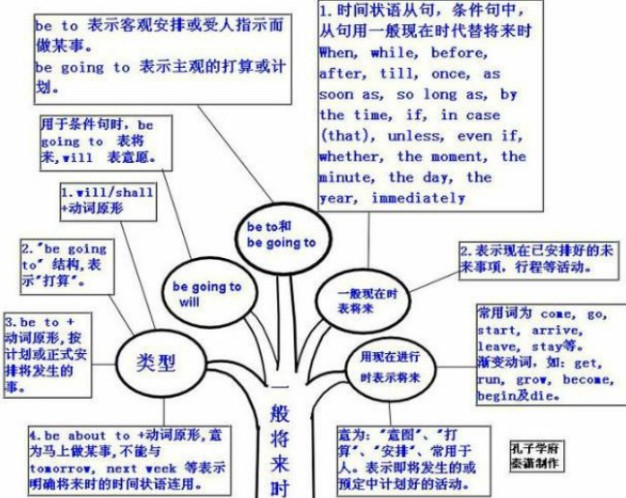本试题 “__Look at these black clouds.It________soon.__Sure.If only we________out.[ ]A.is raining;don't comeB.is going to rain;hadn't comeC.will rain;...” 主要考查您对一般将来时
过去完成时
等考点的理解。关于这些考点您可以点击下面的选项卡查看详细档案。
- 一般将来时
- 过去完成时
一般将来时的概念:
一般将来时表示将来某一时刻的发生动作或状态,或将来某一段时间内经常的动作或状态。常与表示将来的时间状语连用。
一般将来时用法:
1)shall用于第一人称,常被will所代替。will在陈述句中用于各人称,在征求意见时常用于第二人称。
例如:Which paragraph shall I read first?我先读哪一段呢?
Will you be at home at seven this evening? 今晚七点回家好吗?
2)be going to+不定式,表示将来。
a. 主语的意图,即将做某事。
例如:What are you going to do tomorrow? 明天打算作什么呢?
b. 计划,安排要发生的事。
例如:The play is going to be produced next month。这出戏下月开播。
c. 有迹象要发生的事。
例如:Look at the dark clouds, there is going to be a storm. 看那乌云,快要下雨了。
3)be+不定式表将来,按计划或正式安排将发生的事。
例如:We are to discuss the report next Saturday. 我们下星期六讨论这份报告。
4)be about to+不定式,意为马上做某事。
例如:He is about to leave for Beijing. 他马上要去北京。
注意:be about to do不能与tomorrow, next week 等表示明确将来时的时间状语连用。
一般将来时知识体系:

一般现在时表将来:
1)下列动词come, go, arrive, leave, start, begin, return的一般现在时可以表示将来,主要用来表示在时间上已确定或安排好的事情。
例如:The train leaves a tsix tomorrow morning. 火车明天上午六点开。
—When does the bus star? 汽车什么时候开?
—It stars in ten minutes. ?十分钟后。
2)以here, there等开始的倒装句,表示动作正在进行。
例如:Here comes the bus.=The bus is coming. 车来了。
There goes the bell.=The bell is ringing. 铃响了。
3)在时间或条件句中。
例如:When Bill comes(不是will come), ask him to wait for me. 比尔来后,让他等我。
I'll write to you as soon as I arrive there. 我到了那里,就写信给你。
4)在动词hope, take carethat,makesurethat等的宾语从句中。
例如:I hope they have a nice time next week. 我希望他们下星期玩得开心。
Make sure that the windows are closed before you leave the room. 离开房间前,务必把窗户关了。
现在进行时表示将来:
下列动词come, go, arrive, leave, start, begin, return等现在进行时可以表示将来。
例如:I'm leaving tomorrow. 明天我要走了。
Are you staying here till next week? 你会在这儿呆到下周吗?
过去完成时的概念:
过去完成时既可表示过去某个时间或动作之前所发生的事情,也可表示过去某个时间或动作之 前所发生的动作一直持续到过去某个时间。过去完成时由“had+过去分词”构成。
如:She had leant 2000 English words by the end of last month.
过去完成时的应用:
(1)与过去完成时连用的时间状语可以多种多样,使用它的主要依据是看其是否发生在“过去的过去”。
如:He had learnt some English before I went here. 在来这儿之前我学过一些英语。
He had written three stories by last year.到去年他已经写了三篇故事。
We had cleaned the room when he got there. 当他到那儿时,我们已经把房子弄干净了。
He went there after he had finished his work. 他把事做完之后,就去哪儿了。
注意:当主句跟由before, after, as soon as所引导的时间从句的动作连接很紧密时,从句也可用一般过去时。
如:He went there after he read the letter. 他看了那封信后就去那儿了。
(2)过去完成时还经常用于主句为过去时的宾语从句中。
如:He said he had been a soldier. 他说他当过兵。
They said they had seen the film. 他们说这幕电影他们看过。
(3)在hardly/scarcely…when…,nosooner…than…两个结构中的主句通常要用过去完成时。
如:Hardly had I told her the news when she began to cry out. 她一听到这一消息就大哭了起来。
Scarcely had he finished his supper when he went out. 他已吃完晚饭就出去了。
No sooner had he fallen asleep than he lay down on the bed. 他一躺倒床上就睡着了。
(4)动词expect, hope, suppose, think, want等的过去完成时可用来表示未实现的计划、打算或希望。
如:I had hoped to see you. 我本希望来看你。
He had wanted to buy a house in Beijing. 他本想在北京买栋房子。
过去完成时与一般过去时:
(1)过去完成时表示以过去某时间为起点以前所发生的动作或存在的状态,即:过去完成时强调“过去的过去”,而一般过去时只表示以现在时间为起点以前所发生的事情或存在的状态。
如:He studied there two years ago. 他在那儿学习了两年。(离现在两年)
He said he had studied there two years ago. 他说他在那儿学习了两年。(离他说话时两年)
(2)表示过去某个时间以前所连续发生的两个或两个以上的动作时,一般用and, then, but按照动作的先后顺序连接,此时通常用一般过去时而不用过去完成时。
如:He said he went the shop and bought some food. 他说他去商店买了一些食品。
(3)两个动作相继发生,可用一般过去时;如第一个动作需要若干时间完成,用过去完成时。
如:When I heard the news, I was very excited.
(4)叙述历史事实,可不用过去完成时,而只用一般过去时。
如:Our teacher told us that Columbus discovered America in1492.
与“__Look at these black clouds.It________soon.__Sure.If onl...”考查相似的试题有:
- If city noises _____ from increasing, people _____ shout to be heard even at the dinner table20 years from now.[ ]A. ...
- 选词填空。in order to, face to face, a series of, set down, on purpose, suffer from1. I worked hard at English _____ ...
- Robert has rich work experience, so it will for his lack of academic knowledge.A.pick upB.take upC.bring upD.make up
- Lucy asked _____ the night before.A. where did I goB. where had I goneC. where I had goneD. I had gone where
- His father told me that he _____ for the United States three days _____.A. has left; agoB. had left; agoC. left; agoD...
- It was the first time in my life that I ______ the wonderful scene.[ ]A. sawB. had seenC. have seenD. see
- It was not until the subprime loan crisis (次贷危机) ____ great damage to the American financialsystem that Americans...
- The young girl sitting next to me on the plane was very nervous. She ____ before.[ ]A. hasn't flownB. didn't flyC. ha...
- 短文改错。Mrs White is a old woman who has a small room in a small village. She has been living there from 1970. That...
- I arrived late and missed the flight. I _____ the traffic to be so heavy.[ ]A. hadn't expectedB. haven't expectedC. w...